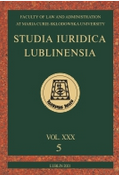Defence Right of the Accused and the Evidence from Slave’s Testimony in the Roman Criminal Procedure
Defence Right of the Accused and the Evidence from Slave’s Testimony in the Roman Criminal Procedure
Author(s): Andrzej ChmielSubject(s): History of Law, Constitutional Law, Criminal Law, Penal Policy, Roman law
Published by: Wydawnictwo Naukowe Uniwersytetu Marii Curie-Sklodowskiej
Keywords: Roman criminal procedure; accused; defence right of the accused; evidence from the interrogation of a slave; quaestio de servis pro domino;
Summary/Abstract: This article presents the question of the accused’s right to defend himself in the light of the prohibition of interrogation of slaves in favour of their masters (quaestio de servis pro domino) expressed both in non-legal texts and in the writings of the jurists of the classical period, and in the imperial constitutions. It has been shown in the paper that the prohibition constituted a quite interesting procedural solution, which, in fact, did not entirely exclude the right of the accused owner to defend himself during the criminal trial. The testimony of the slave his master demanded to be interrogated as part of broadly understood iudicium publicum was therefore regarded as subsidiary (auxiliary) evidence. The admissibility of the evidence from the interrogation of a slave pro domino was within the discretionary power of the judge, the scope of which, however, was in this case statutorily defined. Seemingly restrictive procedural solutions concerning the admissibility of slave testimony introduced in criminal cases in Roman law in various historical periods did not contradict the main procedural principles developed by the Quirites over the centuries and known to this day.
Journal: Studia Iuridica Lublinensia
- Issue Year: 30/2021
- Issue No: 5
- Page Range: 107-121
- Page Count: 15
- Language: English

